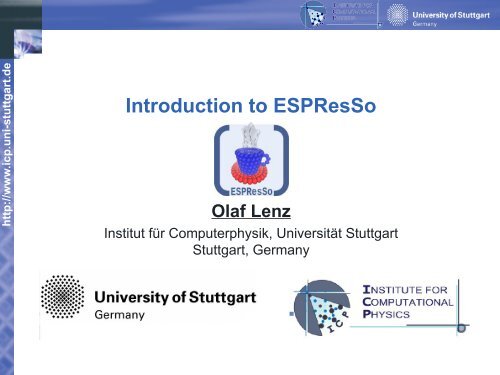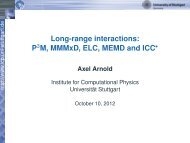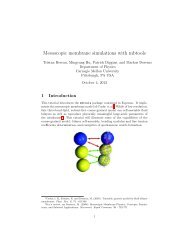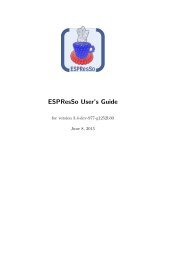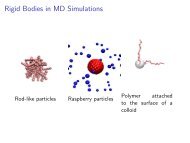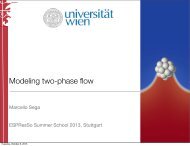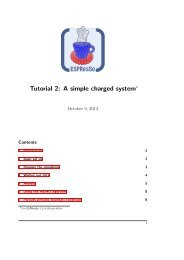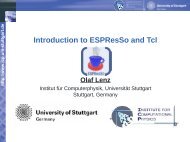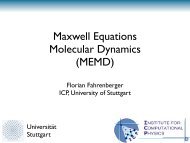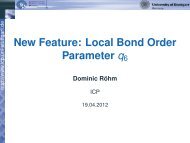Introduction to ESPResSo
Introduction to ESPResSo
Introduction to ESPResSo
Create successful ePaper yourself
Turn your PDF publications into a flip-book with our unique Google optimized e-Paper software.
http://www.icp.uni-stuttgart.de<br />
<strong>Introduction</strong> <strong>to</strong> <strong>ESPResSo</strong><br />
Olaf Lenz<br />
Institut für Computerphysik, Universität Stuttgart<br />
Stuttgart, Germany
http://www.icp.uni-stuttgart.de<br />
<br />
<br />
Coarse-Graining<br />
All-A<strong>to</strong>m Models<br />
<br />
<br />
Model all a<strong>to</strong>ms and their interactions with semi-quantitative parameters<br />
Only small systems and short times can be simulated<br />
Coarse-Grained Models<br />
<br />
Time scale<br />
Coarse-Graining<br />
All-A<strong>to</strong>m<br />
Quantum<br />
Molecular<br />
Only model “important” degrees of freedom<br />
<br />
Allows for much larger time and length scales<br />
Olaf Lenz<br />
<strong>Introduction</strong><br />
Soft Fluid<br />
Finite<br />
Elements<br />
Length scale<br />
2/29
Why yet another Simulation Package?<br />
http://www.icp.uni-stuttgart.de<br />
<br />
<br />
<br />
<br />
<br />
Coarse-grained Bead-spring models:<br />
Combine several a<strong>to</strong>ms in<strong>to</strong> a single bead<br />
Often combined with other methods<br />
<br />
Special interactions (DPD, Gay-Berne ellipsoids, ...)<br />
<br />
Special integra<strong>to</strong>rs (MCPD, Hybrid MC/MD, ...)<br />
<br />
Combined with lattice models (Lattice-Boltzmann, MEMD, ...)<br />
<br />
<br />
Uncommon simulation pro<strong>to</strong>cols (Simulated annealing, Parallel tempering, …)<br />
Special constraints (Walls, Pores, …)<br />
Standard MD simulation packages (GROMACS, NAMD, AMBER, …)<br />
are not flexible enough <strong>to</strong> deal with these models<br />
Package must be flexible!<br />
In research, new methods are developed<br />
Building new methods in<strong>to</strong> highly optimized code (GROMACS, NAMD,<br />
AMBER, …) is very hard<br />
Package must be extensible!<br />
Olaf Lenz<br />
<strong>Introduction</strong><br />
3/29
Philosophy<br />
http://www.icp.uni-stuttgart.de<br />
<br />
<br />
<br />
<br />
ES is intended as a research <strong>to</strong>ol and a production platform<br />
ES provides the methods for coarse-grained simulations<br />
However, an understanding of the methods is required <strong>to</strong> be able<br />
<strong>to</strong> use <strong>ESPResSo</strong><br />
ES can not check whether what you do makes sense!<br />
Golden Rules<br />
1. <strong>ESPResSo</strong> can not be used as a black box<br />
2. <strong>ESPResSo</strong> does not do the physics for you<br />
Olaf Lenz<br />
<strong>Introduction</strong><br />
4/29
Methods<br />
http://www.icp.uni-stuttgart.de<br />
<br />
<br />
<br />
<br />
<br />
<br />
<br />
<br />
Integra<strong>to</strong>rs and ensembles: Velocity-Verlet algorithm (NVE), Langevin thermostat<br />
(NVT), Barostat by Dünweg (NPT), Generalized Hybrid Monte-Carlo, Quarternion<br />
integra<strong>to</strong>r for non-spherical particles or point-like dipoles, ...<br />
Nonbonded interactions: Lennard-Jones, Gay-Berne, Buckingham,, …<br />
Bonded interactions: harmonic, FENE, tabulated, bond-angle interaction, dihedral<br />
interaction, ...<br />
Long-range interactions: for electrostatics: P³M, MMM1D, MMM2D, Ewald, ELC and<br />
MEMD; for point-like dipoles: dipolar P³M, ScaFaCoS (FMM, ...), ...<br />
Hydrodynamic interactions: DPD, Lattice-Boltzmann fluid (on GPGPU) coupled <strong>to</strong><br />
particle simulation<br />
Constraints: Particles can be fixed in any directions; walls, pores, spheres...<br />
Analysis: energy components, pressure tensor, forces, distribution functions, structure<br />
fac<strong>to</strong>rs, polymer-specific analysis functions (radius of gyration, ...), output <strong>to</strong> VMD<br />
...and it is continuously growing...<br />
Olaf Lenz<br />
<strong>Introduction</strong><br />
5/29
Availability<br />
http://www.icp.uni-stuttgart.de<br />
<br />
<br />
<br />
<br />
Free, open-source<br />
Source code hosted at GNU Savannah<br />
(not a GNU core project, though)<br />
GNU General Public License (GPLv3)<br />
<br />
<br />
Code may be freely downloaded, modified<br />
and redistributed<br />
Provided that the GPL is kept<br />
Portable<br />
<br />
Can be easily compiled and run on all<br />
POSIX platforms (think: Unix) known <strong>to</strong> us<br />
https://savannah.nongnu.org<br />
/projects/espressomd/<br />
<br />
<br />
Windows?<br />
Distribution packages exist for<br />
?<br />
<br />
Gen<strong>to</strong>o Linux (Chris<strong>to</strong>ph Junghans)<br />
<br />
Fedora Linux (Thomas Spura; in progress)<br />
<br />
… anybody interested in packaging for other<br />
distributions?<br />
Olaf Lenz<br />
<strong>Introduction</strong><br />
6/29
Distribution<br />
http://www.icp.uni-stuttgart.de<br />
<br />
<br />
163 Citations of the 2006 article (Web of Knowledge)<br />
Used by ~20 scientific working groups<br />
Citations per year<br />
(from Web of Science, including self-citations)<br />
Olaf Lenz<br />
<strong>Introduction</strong><br />
7/29
http://www.icp.uni-stuttgart.de<br />
Impact<br />
Olaf Lenz<br />
2007<br />
2010<br />
<strong>Introduction</strong><br />
2011<br />
8/29
Code<br />
http://www.icp.uni-stuttgart.de<br />
<br />
<br />
<br />
<br />
From Ohloh<br />
(https://www.ohloh.net/p/<strong>ESPResSo</strong>_MD)<br />
4,946 commits from 59 Contribu<strong>to</strong>rs<br />
~ 123,650 lines of code<br />
Estimate: ~31 person years, ~1.7M$ cost<br />
Olaf Lenz<br />
<strong>Introduction</strong><br />
9/29
Web resources<br />
http://www.icp.uni-stuttgart.de<br />
<br />
Home page<br />
http://espressomd.org<br />
<br />
<br />
<br />
<br />
<br />
<br />
Olaf Lenz<br />
Hosted at ICP<br />
Central resource for users<br />
Downloads<br />
Documentation → next slide<br />
Community and Support<br />
<br />
<br />
<br />
(Link <strong>to</strong>) Bug tracker<br />
(Link <strong>to</strong>) Mailing lists<br />
(Link <strong>to</strong>) Wiki<br />
Developer's Zone (in the wiki)<br />
<br />
<br />
<br />
Developer's docs<br />
(Link <strong>to</strong>) Savannah project<br />
(Link <strong>to</strong>) Source code reposi<strong>to</strong>ry<br />
<br />
<strong>Introduction</strong><br />
Savannah Project Page<br />
https://savannah.nongnu.org/projects/espressomd<br />
/<br />
<br />
<br />
<br />
<br />
<br />
Hosted at GNU Savannah servers<br />
Download area<br />
<br />
Releases and NEWS<br />
Mailing list<br />
espresso-users@nongnu.org<br />
<br />
Only mailings from members are<br />
accepted<br />
Bug tracker<br />
<br />
Report bugs in releases!<br />
Mostly intended for Developers<br />
<br />
<br />
<br />
<br />
<br />
Mailing list<br />
espresso-devel@nongnu.org<br />
News<br />
Source code reposi<strong>to</strong>ry<br />
Task manager<br />
Patch manager<br />
10/29
User Documentation<br />
http://www.icp.uni-stuttgart.de<br />
<br />
<br />
<br />
<br />
User's Guide<br />
<br />
<br />
<br />
<br />
PDF document<br />
In release package<br />
<br />
<br />
Off-line<br />
Matches the release<br />
On web site (from build server)<br />
<br />
<br />
Outline<br />
<br />
<br />
<br />
Up-<strong>to</strong>-date<br />
Contains ToDo-Boxes<br />
<strong>Introduction</strong><br />
First steps: Quick start<br />
Rest: Reference manual<br />
FAQ (on home page)<br />
<br />
<br />
Not very complete<br />
Please contribute!<br />
Mailing list archive<br />
Bug tracker<br />
Olaf Lenz<br />
<strong>Introduction</strong><br />
11/29
Getting Help<br />
http://www.icp.uni-stuttgart.de<br />
<br />
<br />
RTFM!<br />
<br />
<br />
<br />
FAQ<br />
User's Guide<br />
Mailing list archives<br />
Use Mailing List<br />
<br />
<br />
<br />
<br />
Include version, OS, features<br />
Also send replies <strong>to</strong> the list<br />
<br />
<br />
If you send huge files, better provide a link<br />
In a long, detailed discussion you can just<br />
send a summary at the end<br />
Please remember: the developers are not<br />
paid for replying!<br />
Please do not write <strong>to</strong> developers<br />
personally<br />
<br />
<br />
All mailings are archived so others can<br />
benefit<br />
Mailing list reaches everybody<br />
Olaf Lenz<br />
<strong>Introduction</strong><br />
12/29
Requirements<br />
http://www.icp.uni-stuttgart.de<br />
<br />
<br />
<br />
<br />
C-Compiler (GNU CC is best tested)<br />
Bourne shell, GNU make<br />
Tcl<br />
<br />
Including headers / devel package!<br />
Optional<br />
<br />
<br />
<br />
FFTW<br />
<br />
<br />
MPI<br />
<br />
<br />
<br />
<br />
CUDA<br />
<br />
<br />
Including headers<br />
Required for P3M<br />
e.g. OpenMPI, MPICH<br />
Including headers<br />
Required for parallel execution<br />
Useful <strong>to</strong> know how <strong>to</strong> use it<br />
For LB-GPU code<br />
More in the future?<br />
Olaf Lenz<br />
<strong>Introduction</strong><br />
13/29
Compiling<br />
http://www.icp.uni-stuttgart.de<br />
<br />
<br />
Necessary evil<br />
<br />
<br />
Few binary packages exist<br />
For optimal performance,<br />
recompilation is necessary<br />
Typically 3 steps<br />
<br />
Configure code configure<br />
<br />
<br />
<br />
Use --help <strong>to</strong> get options<br />
Use CPPFLAGS and LDFLAGS when<br />
libraries are installed non-standard<br />
Logfile config.log contains<br />
additional information<br />
<br />
Compile code make<br />
<br />
<br />
Installation is usually not<br />
required<br />
Separate source and build dir<br />
<br />
<br />
<br />
<br />
The Source dir is where the source<br />
code resides<br />
The Build dir is where all files<br />
created by the compilation are<br />
created<br />
No file in the Source dir is modified<br />
Call configure from the build dir<br />
cd $builddir;<br />
$srcdir/configure<br />
<br />
Use -j np <strong>to</strong> compile in parallel<br />
<br />
Run testsuite make check<br />
<br />
Use processors=”1 2” <strong>to</strong> specify<br />
the numbers of tasks<br />
Olaf Lenz<br />
<strong>Introduction</strong><br />
14/29
Activating and Deactivating Features<br />
http://www.icp.uni-stuttgart.de<br />
<br />
<br />
<br />
<br />
<br />
<strong>ESPResSo</strong> supports various<br />
different features<br />
Not all features are compiled in<br />
To check, call code_info<br />
Create file myconfig.h in build<br />
or source dir <strong>to</strong> change the<br />
default set of features<br />
Use minimal set of features for<br />
optimal performance<br />
#define PARTIAL_PERIODIC<br />
#define ELECTROSTATICS<br />
#define DIPOLES<br />
#define ROTATION<br />
#define ROTATIONAL_INERTIA<br />
#define MDLC<br />
#define EXTERNAL_FORCES<br />
#define CONSTRAINTS<br />
#define MASS<br />
#define EXCLUSIONS<br />
#define COMFORCE<br />
<br />
The term “features” is probably<br />
not well chosen<br />
#define COMFIXED<br />
#define MOLFORCES<br />
<br />
The code has a lot of features that<br />
do not have a compiler switch<br />
#define MODES<br />
#define BOND_VIRTUAL<br />
<br />
Goal: remove all features<br />
Example myconfig.h<br />
Olaf Lenz<br />
<strong>Introduction</strong><br />
15/29
http://www.icp.uni-stuttgart.de<br />
<br />
<br />
Architecture<br />
Simulation core<br />
<br />
<br />
<br />
Written in ANSI C<br />
MPI parallelized<br />
Optimized<br />
Control layer<br />
<br />
<br />
<br />
<br />
Simulation core is controlled via the<br />
scripting language Tcl<br />
High-level Tcl commands <strong>to</strong> control<br />
the simulation and analyze the<br />
system<br />
A simulation is defined by an<br />
“<strong>ESPResSo</strong> script”<br />
Tcl script is not executed in parallel!<br />
CPU 0<br />
Tcl<br />
<strong>ESPResSo</strong><br />
script<br />
Master<br />
Tcl Interface<br />
C<br />
MPI<br />
Slave<br />
CPU 1<br />
.<br />
.<br />
setmd box_l 10.0 10.0 10.0<br />
integrate 1000<br />
# compute kinetic energy<br />
set e_kin \<br />
[analyze energy kinetic]<br />
.<br />
.<br />
C<br />
MPI<br />
Slave<br />
CPU 2<br />
C<br />
Example <strong>ESPResSo</strong> script<br />
Olaf Lenz<br />
<strong>Introduction</strong><br />
16/29
Writing an <strong>ESPResSo</strong> Script<br />
http://www.icp.uni-stuttgart.de<br />
<br />
<br />
Example files: lj.tcl and<br />
stretched_polymer.tcl<br />
<br />
<br />
lj.tcl: Lennard-Jones fluid<br />
stretched_polymer.tcl:<br />
Stretched polymer<br />
Outline<br />
<br />
<br />
<br />
<br />
Set up the system<br />
Set up the particles<br />
Set up the interactions<br />
Running the simulation<br />
Snapshot of the LJ system<br />
<br />
Warmup integration<br />
<br />
Main integration<br />
<br />
Analysis<br />
<br />
Sections correspond roughly <strong>to</strong><br />
chapters in UG<br />
<br />
Detailed command syntax can be<br />
found in UG<br />
Schema of the stretched polymer<br />
Olaf Lenz<br />
<strong>Introduction</strong><br />
17/29
Setting Up the System: Global Variables<br />
http://www.icp.uni-stuttgart.de<br />
<br />
<br />
<br />
<br />
<br />
Set global variables with setmd varname value<br />
e.g. Box size, Periodicity, Time step, Skin size, Cell size, …<br />
Many are set <strong>to</strong> sensible defaults<br />
Get global variable with setmd varname<br />
Many commands can be used without argument <strong>to</strong> get information<br />
# define the system size<br />
setmd box_l $box_size $box_size $box_size<br />
# set up the integra<strong>to</strong>r time step<br />
setmd time_step 0.01<br />
# the skin has no effect on the result, only on the speed<br />
setmd skin 0.4<br />
# uncomment the following <strong>to</strong> output the box size<br />
#puts [setmd box_l]<br />
Olaf Lenz<br />
<strong>Introduction</strong><br />
18/29
Setting Up the System: Thermostat<br />
http://www.icp.uni-stuttgart.de<br />
<br />
<br />
<br />
<br />
<br />
Command thermostat<br />
Misnomer: used <strong>to</strong> set ensemble (e.g. Barostat)<br />
Turn on Langevin thermostat<br />
thermostat langevin temperature gamma<br />
Turn off thermostat thermostat off<br />
Other “thermostats”<br />
<br />
<br />
<br />
npt_isotropic (NPT)<br />
Generalized Hybrid Monte-Carlo (GHMC; NPT and more)<br />
DPD (see Friday)<br />
# set up the thermostat<br />
set langevin_gamma 1.0<br />
thermostat langevin $temperature $langevin_gamma<br />
Olaf Lenz<br />
<strong>Introduction</strong><br />
19/29
Setting Up the System: More<br />
http://www.icp.uni-stuttgart.de<br />
<br />
<br />
<br />
<br />
<br />
<br />
Nemd: “Non-equilibrium MD”: special method for creating a shear flow<br />
cellsystem: Changing the cell system<br />
<br />
<br />
<br />
<br />
Turn on Domain decomposition (default)<br />
Turn off Verlet lists<br />
Turn off Cell lists (nsquare)<br />
Use “layered” system (only for MMM2D)<br />
adress: Turn on ADResS<br />
cuda: Set up CUDA device<br />
collision_detection: Turn on collision detection<br />
→ Recent developments<br />
reactions: Turn on reactions → Recent developments<br />
Olaf Lenz<br />
<strong>Introduction</strong><br />
20/29
Setting Up Particles<br />
http://www.icp.uni-stuttgart.de<br />
<br />
<br />
<br />
<br />
<br />
<br />
<br />
<br />
<br />
Create a single particle: part pid arguments<br />
<br />
<br />
pid specifies a numeric id<br />
Holes in pid order cost memory<br />
Possible arguments: position (required in first call), velocity, charge, mass, type<br />
Create bonds <strong>to</strong> other particles (bond)<br />
Fix particle in one or more directions (fix)<br />
Apply external force <strong>to</strong> particle (ext_force)<br />
Set individual temperature<br />
Make it virtual → Recent developments<br />
Delete a particle (delete)<br />
Get particle properties part print arguments<br />
# generate $n_part particles at random positions<br />
for {set i 0} { $i < $n_part } {incr i} {<br />
set x [expr $box_size*[t_random]]<br />
set y [expr $box_size*[t_random]]<br />
set z [expr $box_size*[t_random]]<br />
part $i pos $x $y $z type 0<br />
}<br />
Olaf Lenz<br />
<strong>Introduction</strong><br />
21/29
Creating Groups of Particles<br />
http://www.icp.uni-stuttgart.de<br />
<br />
<br />
Tcl commands <strong>to</strong> create many particles at once<br />
<br />
Polymers polymer<br />
<br />
Counterions counterions<br />
<br />
Salt salt<br />
<br />
Diamond polymer<br />
networks<br />
diamond<br />
<br />
Icosaeder icosaeder<br />
<br />
Copy existing particles<br />
copy_particles<br />
Create extended objects constraint<br />
<br />
<br />
Walls, Spheres, Cylinders, Pores, Rods, Rhomboid, Planes<br />
External magnetic field<br />
Olaf Lenz<br />
<strong>Introduction</strong><br />
22/29
Oriented Particles<br />
http://www.icp.uni-stuttgart.de<br />
<br />
<br />
<br />
<br />
<br />
<br />
<br />
Feature ROTATION<br />
Particles have an orientation<br />
Useful for<br />
<br />
<br />
<br />
GB-ellipsoids<br />
(coarse-grained liquid crystals)<br />
Directional Lennard-Jones<br />
Point-like dipoles<br />
(→ dipolar P3M, Thursday)<br />
Quarternion integra<strong>to</strong>r<br />
Roughly 30% slower!<br />
Currently, all particles have the<br />
rotational degrees of freedom<br />
Switchable rotation is under<br />
review<br />
Olaf Lenz<br />
<strong>Introduction</strong><br />
23/29
Setting Up Interactions<br />
http://www.icp.uni-stuttgart.de<br />
<br />
<br />
Non-bonded Short-range<br />
Interactions<br />
<br />
<br />
<br />
Work between particle types<br />
Lennard-Jones, Morse, Buckingham,<br />
Smooth-step (DPD), …<br />
Tabulated<br />
Bonded interactions<br />
<br />
<br />
Work between two (or more) specific<br />
particles (can be set in part)<br />
Have a bondid<br />
<br />
<br />
Long-range Interactions<br />
<br />
<br />
<br />
<br />
Electrostatics<br />
Magne<strong>to</strong>statics (point-like dipoles)<br />
Hydrodynamic interactions<br />
→ next days<br />
No force fields built in!<br />
<br />
<br />
<br />
<br />
Bond-length 2-body interaction:<br />
Harmonic, FENE, …<br />
Bond-angle 3-body interaction:<br />
Harmonic, Cosine, …<br />
Dihedral 4-body interaction<br />
2-body interactions can be made rigid<br />
<br />
Not well-tested<br />
set lj_epsilon 1.0<br />
set lj_sigma 1.0<br />
set lj_cu<strong>to</strong>ff 2.5<br />
inter 0 0 lennard-jones \<br />
$lj_epsilon $lj_sigma \<br />
$lj_cu<strong>to</strong>ff<br />
puts "Interactions:\n[inter]"<br />
Olaf Lenz<br />
<strong>Introduction</strong><br />
24/29
Exclusions<br />
http://www.icp.uni-stuttgart.de<br />
<br />
<br />
Often, neighboring particles in a chain should not interact via nonbonded<br />
interactions<br />
Two possibilities<br />
<br />
<br />
Bonded subtracted LJ potential lj_subst<br />
Exclusions (Feature EXCLUSIONS)<br />
<br />
Explicitly exclude interactions between particles part exclude<br />
<br />
Au<strong>to</strong>matically exclude some interactions part au<strong>to</strong>_exclusions<br />
Olaf Lenz<br />
<strong>Introduction</strong><br />
25/29
Running the simulation<br />
http://www.icp.uni-stuttgart.de<br />
<br />
<br />
<br />
<br />
<br />
<br />
Main integra<strong>to</strong>r: Velocity Verlet<br />
Do a number of integration steps integrate steps<br />
Use integrate 0 <strong>to</strong> update the forces or positions of virtual sites<br />
Warmup integration<br />
<br />
Cap the maximal force inter ljforcecap F_max<br />
<br />
<br />
Prevents overlapping particles and very high forces<br />
Do steps until the large forces disappear<br />
Main integration<br />
<br />
<br />
Switching between Tcl and C has an overhead<br />
Do as many steps in a single integrate command<br />
Advanced commands for integration<br />
<br />
<br />
Parallel tempering<br />
Metadynamics<br />
for { set i 0 } { $i < 100 } { incr i } {<br />
integrate 1000<br />
.<br />
.<br />
Olaf Lenz<br />
<strong>Introduction</strong><br />
26/29
Analysis<br />
http://www.icp.uni-stuttgart.de<br />
<br />
<br />
Analysis can be done on Tcl level!<br />
<br />
<br />
<br />
Use part print <strong>to</strong> get particle positions, velocities, etc.<br />
Allows for anything you can think of<br />
… but maybe slow<br />
<br />
<br />
slow numerics in Tcl<br />
not parallel<br />
Parallel Analysis in C analyze<br />
<br />
<br />
Many different observables<br />
<br />
<br />
<br />
Energies, pressures, stress tensor…<br />
Minimal distances, RDF, structure fac<strong>to</strong>r, …<br />
Polymer observables: end-<strong>to</strong>-end distance, radius of gyration, …<br />
Analyzing several configurations<br />
<br />
S<strong>to</strong>re configuration analyze append<br />
<br />
Retreive s<strong>to</strong>red configurations analyze configs<br />
<br />
<br />
Some analysis commands can handle s<strong>to</strong>red configs (e.g. analyze )<br />
More Advanced Analysis → Recent developments<br />
Olaf Lenz<br />
<strong>Introduction</strong><br />
27/29
File I/O and Visualization<br />
http://www.icp.uni-stuttgart.de<br />
<br />
<br />
<br />
No general <strong>ESPResSo</strong>-format<br />
<br />
What should be s<strong>to</strong>red in the file?<br />
<br />
<br />
Particle positions, box size<br />
Interactions, Tcl variables?<br />
No real checkpointing<br />
<br />
It is not clear what belongs <strong>to</strong> the<br />
state of the simulation<br />
<br />
e.g. RNG state, number of tasks, …<br />
Blockfile format<br />
<br />
Allows <strong>to</strong> write specified blocks of<br />
information<br />
blockfile $f write particles<br />
<br />
Visualize best with VMD<br />
<br />
<br />
Off-line<br />
<br />
<br />
<br />
<br />
On-line<br />
<br />
<br />
Recommended: Create VTF files<br />
writevsf <strong>to</strong> output the structure<br />
in<strong>to</strong> the VTF file<br />
writevcf <strong>to</strong> output a configuration<br />
in<strong>to</strong> the VTF file<br />
Can also create PSF and PDB<br />
VMD has a pro<strong>to</strong>col for on-line<br />
visualization<br />
In general, off-line is more useful<br />
<br />
Can read in these blocks<br />
blockfile $f read au<strong>to</strong><br />
<br />
Jump in<strong>to</strong> the main loop needs<br />
<strong>to</strong> be done manually<br />
Olaf Lenz<br />
<strong>Introduction</strong><br />
28/29
http://www.icp.uni-stuttgart.de<br />
That's all.<br />
Thanks for your<br />
attention!<br />
Olaf Lenz<br />
<strong>Introduction</strong><br />
29/29


